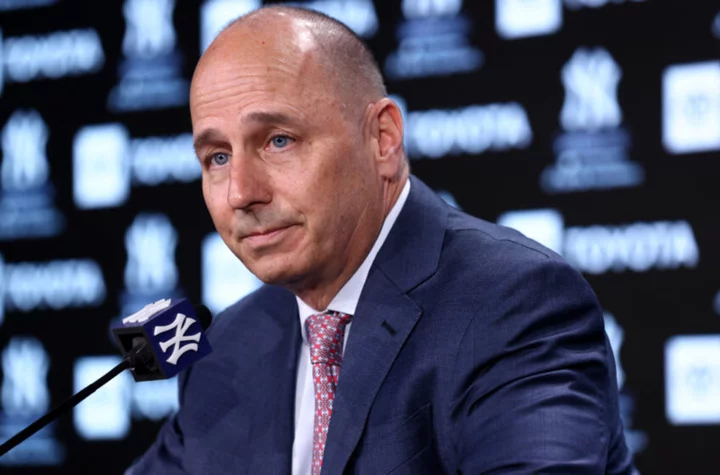
Nearly half of US adults are interested in taking weight loss prescription drugs, survey finds
A new survey has found that nearly half of adults in the United States are interested in taking prescription drugs for weight loss, such as Ozempic or Wegovy. In a KFF health tracking poll published on 3 August, researchers reported that 45 per cent of adults said they’d be interested in taking a “safe and effective” prescription drug for weight loss. Meanwhile, seven in 10 adults said they’ve heard at least “a little” about a new class of drugs being used for weight loss, with about one in five saying they have heard “a lot” about these drugs. Ozempic is a type 2 diabetes medication known for its weight loss side effects. Similar semaglutide injections, such as Wegovy and Mounjaro, have been specifically approved for the treatment of obesity and weight loss. This class of drugs called GLP-1 agonists works by mimicking a hormone called glucagon-like peptide 1 (GLP-1), regulating blood sugar levels and slowing down the rate at which food leaves the stomach to create the feeling of fullness. Of the US adults surveyed, older groups were some of the most aware of prescription weight loss drugs, with 76 per cent being those who have been told by a doctor in the past five years that they are overweight or obese. Nearly 60 per cent of those surveyed said they were currently trying to lose weight as well. While there was an overall interest in taking a prescription weight loss drug, that interest significantly decreased when people were asked whether they would take the medication as a routine injection. Only 16 per cent of adults said they would still take Ozempic or Wegovy, even if it wasn’t covered by their health insurance and was not specifically approved by the US Food and Drug Administration for weight loss. In fact, most people believed that insurance companies should cover the cost of weight loss drugs for adults who are overweight or obese, with an overwhelming 80 per cent of adults. Additionally, a large majority of adults believed the substantial profits that pharmaceutical companies have made from increased demand for weight loss drugs is a major factor contributing to the cost of injections like Ozempic and Wegovy. According to Novo Nordisk, the pharmaceutical company behind these prescription drugs for diabetes and weight loss, the list price for Ozempic can cost $935.77 per month without health insurance. Although the majority of adults said they trust pharmaceutical companies like Novo Nordisk to provide “reliable information” about safety and side effects of GLP-1 agonists, only 22 per cent said they trust these companies to price their products fairly. The FDA has listed the most common side effects of taking Wegovy as nausea, diarrhea, vomiting, constipation, abdominal pain, headache, fatigue, indigestion, dizziness, and digestive disorders. More serious complications can occur from use of Wegovy or Mounjaro, such as the “potential risk of thyroid C-cell tumours,” pancreatitis, gallbladder problems, acute kidney injury, increased heart rate, and suicidal behaviour or thinking. Taking Ozempic can also lead to possible thyroid tumours, including cancer, pancreatitis, changes in vision, and kidney and gallbladder problems. Recently, several patients reported suffering from severe gastroparesis, also known as stomach paralysis, after taking the prescription weight loss medications. In a report from CNN, two people claimed that their “stomachs are paralysed” after taking Ozempic. “I wish I never touched it. I wish I’d never heard of it in my life,” Joanie Knight, a 37-year-old from Louisiana, told CNN. “This medicine made my life hell. So much hell. It has cost me money. It cost me a lot of stress; it cost me days and nights and trips with my family. It’s cost me a lot, and it’s not worth it. The price is too high.” One woman was also diagnosed with cyclic vomiting syndrome, which causes her to throw up multiple times a day. “I’ve almost been off Ozempic for a year, but I’m still not back to my normal,” said Emily Wright, a 38-year-old teacher from Toronto. Shortly after the report, the FDA shared in a statement with The Independent that it has become aware of stomach paralysis occurring among patients taking the medications. “The FDA has received reports of gastroparesis with semaglutide and liraglutide, of which some documented the adverse event as not recovered after discontinuation of the respective product at the time of the report,” the agency said. However, officials clarified that they were unable to determine whether taking Ozempic or Wegovy was the cause of stomach paralysis, or if it was caused by a different issue. “Gastroparesis can be a complication of diabetes that is related to long-standing or poorly controlled disease, further complicating the ability to determine what role the drugs played in the reported events,” the FDA added. In response to reports of stomach paralysis, drug manufacturer Novo Nordisk noted that these medications have been used to treat type 2 diabetes “for more than 15 years”, and for the “treatment of obesity” for eight years. “Semaglutide has been extensively examined in robust clinical development programs, large real world evidence studies and has cumulatively over 9.5 million patient years of exposure,” a spokesperson for Novo Nordisk said in a statement to The Independent. “Gastrointestinal (GI) events are well-known side effects of the GLP-1 class. For semaglutide, the majority of GI side effects are mild to moderate in severity and of short duration. GLP-1’s are known to cause a delay in gastric emptying, as noted in the label of each of our GLP-1 RA medications. Symptoms of delayed gastric emptying, nausea and vomiting are listed as side effects.” Read More Obese people on weight-loss jabs ‘should be prepared to stay on them for life’ Ozempic users report stomach paralysis as weight loss drug side effect: ‘I wish I never touched it’ Sharon Osbourne says she was ‘nauseous’ for weeks after taking Ozempic to lose weight Sharon Osbourne reveals what Ozempic did to her when she was taking it Ozempic users report stomach paralysis as side effect: ‘I wish I never touched it’ Lorraine Candy: ‘Perimenopausal rage made me unravel’
1970-01-01 08:00

4 players Braves missed on at the deadline, but can sign this offseason
The Atlanta Braves weren't active at the trade deadline but they can sign some of the players they missed on trading for in free agency this offseason.As the dust settled on the 2023 MLB Trade Deadline, the Atlanta Braves didn't make much noise. It's been made clear that Alex Anth...
1970-01-01 08:00

3 dream replacements for Brian Cashman if the New York Yankees fire him
Things have not gone well for the New York Yankees once again this season. Could this be the end for general manager Brian Cashman?After a less-than-exciting trade deadline and the revelation that Anthony Rizzo is finally heading to the injured list for concussion symptoms from a mid-May collisi...
1970-01-01 08:00

Belittle by Belittle: Noel Gallagher calls rival sibling Liam Gallagher the 'tambourine player' in Oasis
Noel Gallagher has belittled his brother's role in Oasis and called him a "loose cannon".
1970-01-01 08:00

The devastating mental health impact of soaring mortgage costs
Almost a third of people in England and Wales said their mental health has been affected by soaring mortgage costs in the past year, according to new research. For people with existing mental health problems, nearly four in 10 said the rising costs had worsened their mental health. Mind, the UK’s biggest mental health charity, also said it had seen a 55 per cent increase in the number of people contacting its Infoline over the last 18 months about financial difficulties, including welfare, unemployment and personal debt. The charity’s survey of 3,015 respondents across England and Wales in March and April came before Thursday’s news that the Bank of England had raised interest rates to 5.25 per cent from 5 per cent. The hike, which is yet another bid to get inflation under control, will put more pressure on mortgage holders. Mind’s survey – carried out by Censuswide – suggested that 29 per cent of people had been affected by hearing about or experiencing increasing mortgage costs over the last year. Ten per cent said that it had affected their mental health a lot, the charity added. For people with existing mental health problems, some 36% said the increasing mortgage costs had made their mental health worse. The charity said younger people were particularly affected, with almost half (48%) of those aged between 16 and 24 saying that the mortgage situation had impacted on their mental health. Vicki Nash, Mind’s associate director of external affairs, said financial difficulties and mental health problems “often form a vicious cycle”. She said: “As we continue to grapple with the rising cost of living, news of yet another possible increase in mortgage rates will be difficult for many families to bear. “Money problems and mental health often form a vicious cycle, and when we’re struggling to deal with one, the other can become much harder to manage, particularly when it threatens to impact our housing situation. “We know some people are becoming so unwell that they need hospital treatment for their mental health. “When this happens the care they receive when they leave hospital is critical so we are calling for the introduction of comprehensive welfare checks, including of people’s financial situation. “These figures show this is a mental health emergency that everyone is going to need help to deal with. We know we can’t fix the cost-of-living crisis but support for your mental health is out there, and we are here for you. “This includes through Mind’s Infoline, online community, Side by Side and the useful information on our website that will be available throughout this difficult period.” Mind has a confidential information and support line which can be called on 0300 123 3393 between 9am and 6pm from Monday to Friday, or people can visit mind.org.uk. Read More ‘Unsackable’ Jeremy Hunt to remain chancellor as Rishi Sunak eyes ‘election-ready’ Cabinet reshuffle Lizzo: All the allegations made by former dancers – from sexual harassment to body shaming The Bank hikes interest rates again – but the end of the pain could finally be in sight Charity boss speaks out over ‘traumatic’ encounter with royal aide Ukraine war’s heaviest fight rages in east - follow live
1970-01-01 08:00

Damon Albarn: 'We're gonna need more drugs to get through absurd AI'
Damon Albarn is not a fan of AI-created music and branded people who use software to create tunes like other artists are "f****** idiots".
1970-01-01 08:00

Soaring mortgage costs ‘affecting mental health of almost a third of people’
Almost a third of people in England and Wales said their mental health has been affected by soaring mortgage costs in the past year, according to new research. For people with existing mental health problems, nearly four in 10 said the rising costs had worsened their mental health. Mind, the UK’s biggest mental health charity, also said it had seen a 55% increase in the number of people contacting its Infoline over the last 18 months about financial difficulties, including welfare, unemployment and personal debt. The charity’s survey of 3,015 respondents across England and Wales in March and April came before Thursday’s news that the Bank of England had raised interest rates to 5.25% from 5%. The hike, which is yet another bid to get inflation under control, will put more pressure on mortgage holders. Mind’s survey – carried out by Censuswide – suggested that 29% of people had been affected by hearing about or experiencing increasing mortgage costs over the last year. Ten per cent said that it had affected their mental health a lot, the charity added. For people with existing mental health problems, some 36% said the increasing mortgage costs had made their mental health worse. Money problems and mental health often form a vicious cycle, and when we’re struggling to deal with one, the other can become much harder to manage, particularly when it threatens to impact our housing situation Vicki Nash, Mind The charity said younger people were particularly affected, with almost half (48%) of those aged between 16 and 24 saying that the mortgage situation had impacted on their mental health. Vicki Nash, Mind’s associate director of external affairs, said financial difficulties and mental health problems “often form a vicious cycle”. She said: “As we continue to grapple with the rising cost of living, news of yet another possible increase in mortgage rates will be difficult for many families to bear. “Money problems and mental health often form a vicious cycle, and when we’re struggling to deal with one, the other can become much harder to manage, particularly when it threatens to impact our housing situation. “We know some people are becoming so unwell that they need hospital treatment for their mental health. “When this happens the care they receive when they leave hospital is critical so we are calling for the introduction of comprehensive welfare checks, including of people’s financial situation. “These figures show this is a mental health emergency that everyone is going to need help to deal with. We know we can’t fix the cost-of-living crisis but support for your mental health is out there, and we are here for you. “This includes through Mind’s Infoline, online community, Side by Side and the useful information on our website that will be available throughout this difficult period.” Mind has a confidential information and support line which can be called on 0300 123 3393 between 9am and 6pm from Monday to Friday, or people can visit mind.org.uk. Read More Charity boss speaks out over ‘traumatic’ encounter with royal aide Ukraine war’s heaviest fight rages in east - follow live Consuming foods with added sugars may increase risk of kidney stones – study Why TikTok is going wild for lip oil 5 late summer blooms to plant now
1970-01-01 08:00

Consuming foods with added sugars may increase risk of kidney stones – study
Consuming foods with added sugars – such as soft drinks, ice-cream and cakes – may increase the risk of developing kidney stones, according to scientists. Researchers have found that those in the US with the highest intake of added sugars had nearly 40% greater odds of developing kidney stones. They said this association was more prevalent among Asians as well as Native Americans. But the researchers pointed out that their study, published in the journal Frontiers, does not show how exactly added sugars increases the risk of kidney stones. Lead author Dr Shan Yin, a researcher at the Affiliated Hospital of North Sichuan Medical College, Nanchong, China, said: “Ours is the first study to report an association between added sugar consumption and kidney stones. “It suggests that limiting added sugar intake may help to prevent the formation of kidney stones.” One in 11 people will get stone symptoms during their lifetime, according to The British Association of Urological Surgeons. Ours is the first study to report an association between added sugar consumption and kidney stones. Dr Shan Yin Known risk factors include obesity, inflammatory bowel disease, diabetes, and being an adult male. For the study, the Dr Yin and colleagues analysed data from more than 28,000 people who were part of the US National Health and Nutrition Examination Survey (NHANES) survey. Each person’s daily intake of added sugars was estimated from their self reported food and drink consumption. They also received a healthy eating index score (HEI-2015), based on the food they ate, whether it was beneficial foods such as fruits, vegetables, and whole grains, or less healthy options such as refined grains or saturated fat. The researchers adjusted for factors such as gender, age, race or ethnicity, income, body mass index, HEI-2015 score, smoking status, and whether the people taking part in the study had a history of diabetes. The researchers said people who received more than 25% of their total energy from added sugars had a 88% greater odds than those who had less than 5% of their total energy from added sugars. Results also showed people below poverty levels had greater odds of developing kidney stones when exposed to more added sugars than those at or slightly above poverty levels. Dr Yin said: “Further studies are needed to explore the association between added sugar and various diseases or pathological conditions in detail. “For example, what types of kidney stones are most associated with added sugar intake? “How much should we reduce our consumption of added sugars to lower the risk of kidney stone formation? “Nevertheless, our findings already offer valuable insights for decision-makers.” Read More Charity boss speaks out over ‘traumatic’ encounter with royal aide Ukraine war’s heaviest fight rages in east - follow live Why TikTok is going wild for lip oil 5 late summer blooms to plant now Why have the birds disappeared from my garden?
1970-01-01 08:00

College football realignment rumors: Notre Dame stance, FSU problem, Pac-12 stalemate
College football realignment rumors: Florida State has a problemThe college football landscape is changing again. The only question is whether Colorado's move to the Big 12 was an aftershock of USC and UCLA moving to the Big Ten or a foreshock of more seismic changes.Florida State is appa...
1970-01-01 08:00

USMNT news: Adams to Villa, Trusty joins Sheffield, McKennie to stay
Today's USMNT news includes Tyler Adams being linked with Aston Villa. Auston Trusty hasofficially been announced as a Sheffield United player and Weston McKennie could be set to stay at Juventus.USMNT news: Tyler Adams to Aston VillaTyler Adams has recently been linked with Chelsea but a m...
1970-01-01 08:00

Adam Brody: ‘Method acting sounds f****** boring!’
When asked if he went method for his latest role in the ‘River Wild’ reboot, Adam Brody blasted the immersive technique as sounding “f****** boring”.
1970-01-01 08:00

3 great abs exercises that aren’t crunches
Most of us have been guilty of doing a huge number of crunches in the hope of making our tummies trimmer. Then, two weeks later, we’re disappointed nothing seems to have changed. “Think abs and we tend to think ‘six-pack’ (visible or not) – the long muscle that extends along the front of the abdomen,” says PT and fitness expert, Laura Williams. “This often makes crunches our go-to move when it comes to the tum. But the abdominal muscles also include your waist muscles – your obliques – and one of your main core muscles, the transversus abdominis.” Targeting these areas, she says, with a variety of exercises, will help to strengthen all the important muscles of the abdominal area, as well as those in the upper back and hips, helping with everything from a stronger core to preventing injury. 1. Heel Tap Why: Works core muscles. How: From a lying position with legs bent above hips, lower one heel towards the floor, then lift back up. Change sides. Do a total of 12 lowers. Tip: Try to keep your back flat on the mat. 2. Seated Sprinter Why: Works the waist, hip and thigh muscles. How: From a seated position, with both legs off the floor, extend one leg out in front of you and bring the opposite arm towards your inside knee. Repeat on the other side. Do a total of 12 twists. Tip: Keep your torso lifted throughout. Place feet on the floor to make this easier if needed. 3. Pulsing Side Plank Why: Works the shoulder, hip, thigh and waist muscles. How: Lying on your side, raise your body into the air with your weight on the side of your foot and your bottom arm. Rest your top arm on your bottom shoulder and lower your body a short way to the ground before pushing back up. Do 15 pulses. Change sides. Tip: Reduce your range of movement if you fatigue. Read More Charity boss speaks out over ‘traumatic’ encounter with royal aide Ukraine war’s heaviest fight rages in east - follow live Twiggy: I did not plan to get into modelling ‘Women short-changed as 65% of weekly working hours ignored in official data’ How to wear the casual tailoring look in summer
1970-01-01 08:00
